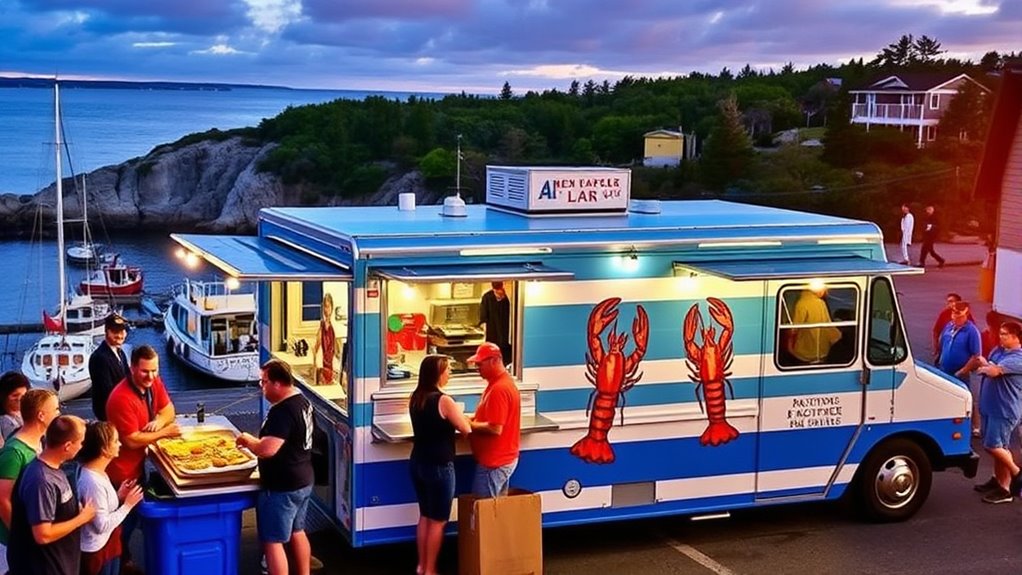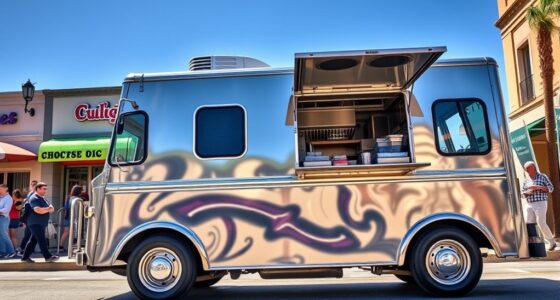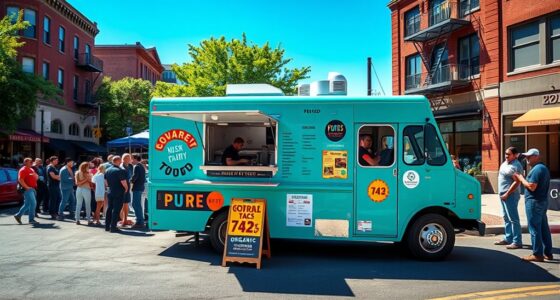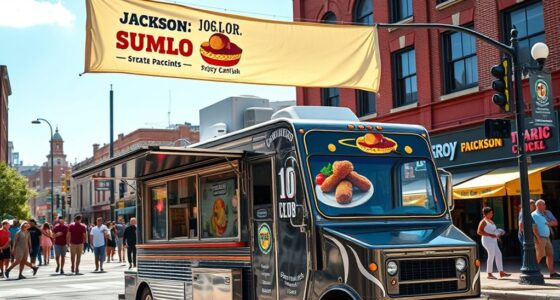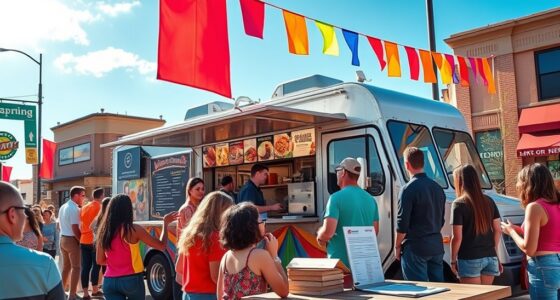To open a food truck in Bar Harbor, Maine, you’ll need permits like a business license, health department HIP license, and a mobile vendor license, costing around $20-$50 each. Startup costs include truck purchase or lease, outfitting, and equipment, totaling $30,000 to over $150,000. Focus on busy spots like Downtown and parks while developing a seasonal, compliant menu. Effective marketing on social media and events boosts visibility—discover more tips to start successfully.
Key Takeaways
- Obtain local business licenses, Maine HIP license, PIC certification, and a mobile vendor license, costing around $20-$65 per permit.
- Budget $30,000-$150,000 for truck purchase and outfitting, plus ongoing costs like permits, inventory, and maintenance.
- Focus on high foot traffic areas such as Downtown Main Street, waterfront parks, and event venues for prime locations.
- Develop a compliant menu with local ingredients, allergen labeling, and options suited to truck equipment and limited space.
- Use social media, participate in local events, and offer loyalty programs to increase visibility and attract customers.
Obtaining Necessary Permits and Licenses in Bar Harbor
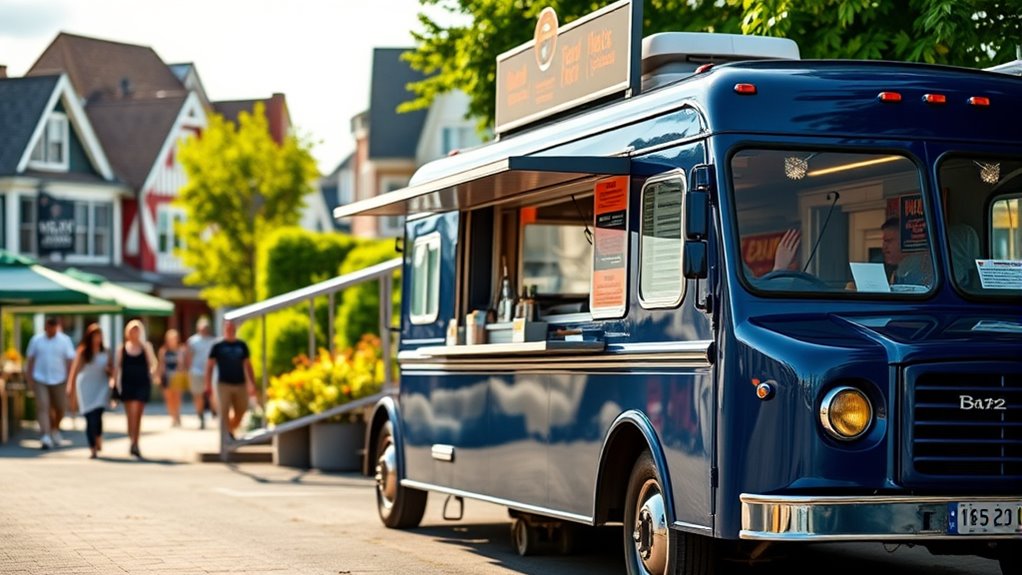
To legally operate a food truck in Bar Harbor, you need to obtain several permits and licenses at both the state and local levels. First, secure a business license through local town or city offices to register your business officially. You’ll also need a Health Inspection Program (HIP) license from the Maine Department of Health, costing $20 annually, for food preparation and service. At least one employee must hold a Certified Food Protection Manager (CFPM) certification, which costs about $65, to guarantee food safety. A Person in Charge (PIC) certification is also required for staff present during operations. For selling packaged foods off-premise, a Mobile Vendor License costs $20 per year. Local requirements include registering with Bar Harbor and possibly obtaining temporary food or special permits for events and entertainment. Additional local permits may be required for specific locations or events. Ensuring compliance with food safety regulations is essential for maintaining your license and providing safe food to customers.
Understanding the Costs of Launching a Food Truck
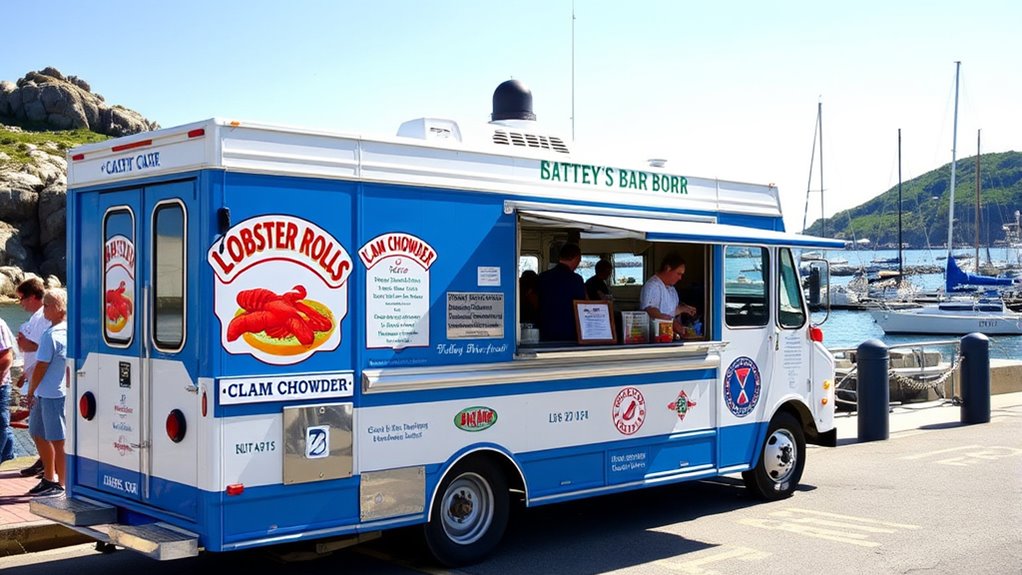
Launching a food truck in Bar Harbor requires careful financial planning, as costs can vary widely depending on your choices. The initial truck purchase ranges from $30,000 for used models to over $150,000 for new or specialty fully-fitted trucks. Leasing options cost about $1,000 to $3,000 monthly, reducing upfront expenses. Outfitting the truck with essential kitchen equipment, such as grills and refrigerators, can add $10,000 to $50,000, while POS systems run $500 to $2,000. You’ll need to budget for inventory, which starts around $1,000 to $3,000, and ongoing expenses like fuel, maintenance, and supplies. Don’t forget costs for insurance, permits, and seasonal adjustments. Planning for these expenses ensures your food truck launch stays financially on track. STARTUP COSTS in Maine can vary depending on the size and type of equipment you choose, so thorough research and budgeting are essential before launching. Additionally, understanding the initial investment required for equipment and permits can help you better prepare financially.
Identifying Prime Locations for Mobile Vending
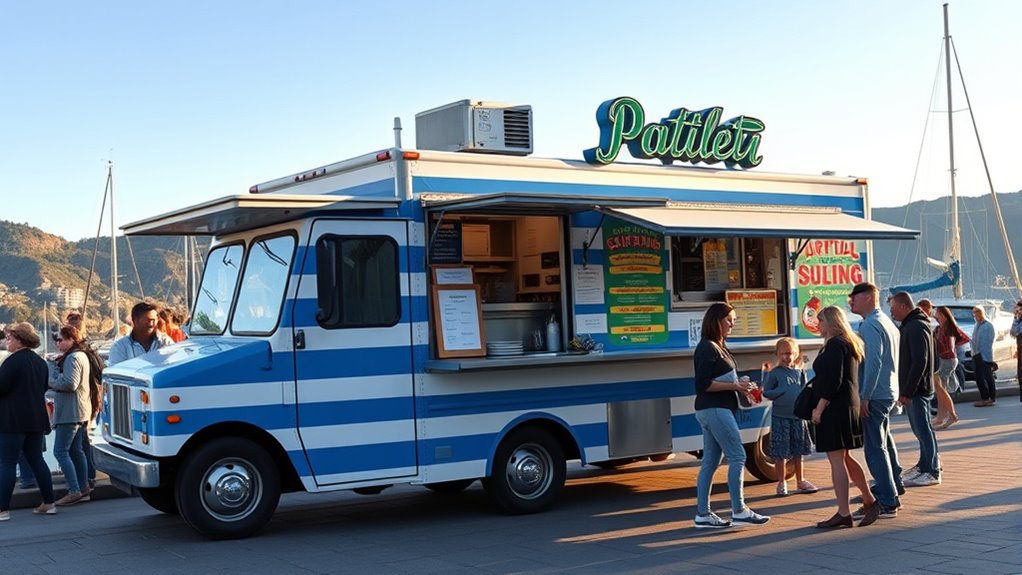
Finding the right locations for your food truck in Bar Harbor can considerably boost your sales and customer base. Focus on high foot traffic areas like Downtown along Main Street, especially during peak tourist season, and near the Bar Harbor Ferry Terminal to catch visitors. Waterfront parks, beaches, and Acadia National Park visitor centers attract large crowds. Consider seasonal spots at festivals, outdoor markets, and event venues like concerts or holiday parades. Ensure your truck is parked in designated zones with easy access, ample space, and visibility, ideally near complementary businesses like breweries or hotels. Look for spots with good signage opportunities and proximity to busy intersections. Being visible, accessible, and strategically located will maximize your chances of attracting both locals and tourists alike. Choosing locations with high visibility is essential to draw in the maximum number of customers and increase sales, especially when considering location scouting to identify optimal spots.
Developing a Compliant and Appealing Menu

Creating a menu that complies with Maine Food Safety Regulations while remaining appealing to customers requires careful planning. First, you need to contemplate the safety standards, such as mandatory health inspections, consumer advisories for raw or undercooked meats, and proper handling of potentially hazardous foods. Second, choose menu items that fit your truck’s equipment—whether low-risk pre-packaged foods, moderate-risk refrigerated items, or high-risk PHFs requiring strict temperature controls. Third, focus on variety and local ingredients to attract diverse customers, offering vegetarian, vegan, or gluten-free options and clearly labeling allergens. Visualize your menu as a balanced showcase of regional flavors, manageable in size, and designed for safe, efficient preparation and service within your truck’s space.
Effective Marketing Strategies to Attract Customers
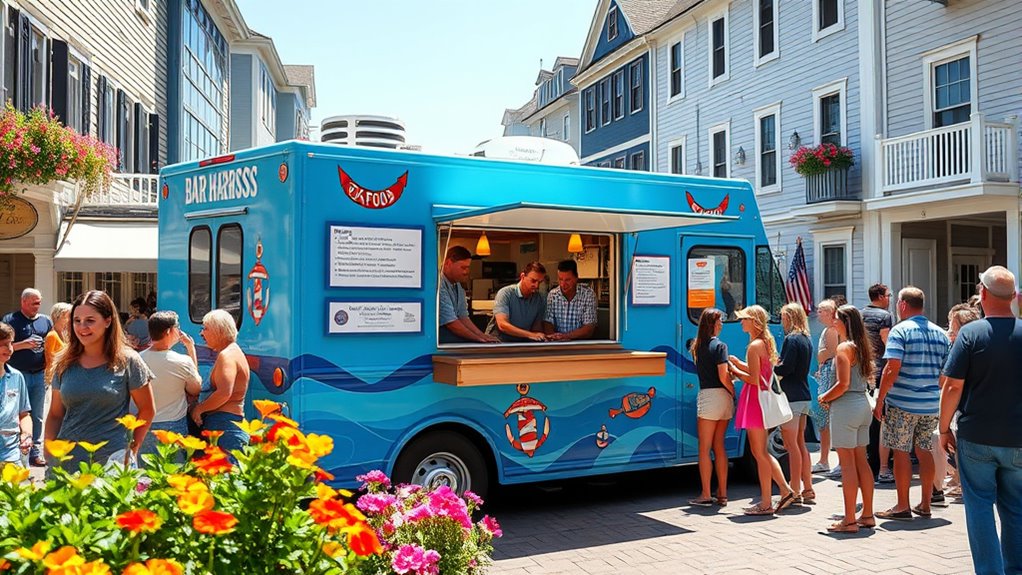
To effectively attract customers to your food truck in Bar Harbor, leveraging social media platforms is essential. Facebook is the top choice, with 75% of trucks using it to promote daily specials, location updates, and engaging content. Regular social media campaigns can boost sales by about 20%, and customers tend to spend 15% more at trucks that actively engage online. Additionally, 40% discover new trucks through social media ads, making targeted advertising vital. Participating in local festivals and community events increases visibility and foot traffic, creating opportunities for direct feedback and partnerships. Building a customer loyalty program encourages repeat visits, with over half of food trucks seeing a 30% increase in returning customers. Over 50% have implemented loyalty programs, which contribute to a 30% increase in repeat visits. Utilizing social media analytics can help refine your marketing strategies and better understand your audience. Combining these strategies ensures you effectively attract and retain a loyal customer base.
Frequently Asked Questions
How Long Does the Permit Approval Process Typically Take in Bar Harbor?
The permit approval process in Bar Harbor usually takes a few weeks to a couple of months. It depends on how quickly you submit complete applications, pass health inspections, and navigate municipal reviews. If zoning or public hearings are needed, expect longer delays. Coordination among town, state, and health departments can also add time. Staying organized and responsive helps speed up the process and get your food truck on the road sooner.
Are There Any Specific Vehicle Size Restrictions for Food Trucks?
You’re wondering if there are specific vehicle size restrictions for food trucks. In Maine, the rules vary by municipality, including Bar Harbor, which generally follows state and local regulations. Your truck must be mobile, without permanent fixtures, and meet size limits set by local authorities. It’s essential to verify with local officials to guarantee your vehicle complies with maximum length, width, and overall dimensions, especially if combining trailers or adding overhead structures.
Can I Operate Year-Round or Are There Seasonal Limitations?
You wonder if you can operate your food truck year-round in Bar Harbor. While there’s no statewide law banning year-round operation, local regulations and seasonal restrictions often limit activity during off-peak months to reduce disturbance. Harsh winters and decreased tourist traffic make year-round operation challenging and less profitable. You’ll need to stay updated on town ordinances, health requirements, and weather considerations to guarantee you’re compliant and prepared for year-round service.
What Are the Requirements for Waste Disposal and Environmental Compliance?
Waste disposal and environmental compliance aren’t just formalities—they’re your responsibility. You’ll need permits for solid waste and liquid waste, guaranteeing proper disposal at approved sites. Recycling and waste reduction are vital, especially for food waste. You must manage hazardous waste, like batteries or oil, carefully. Maintaining sanitation standards, including proper sewage handling, is mandatory. Staying compliant protects the environment, keeps your permit valid, and guarantees your food truck operates smoothly year-round.
Are There Grants or Financial Incentives Available for New Food Truck Businesses?
You’ll find some grants and financial incentives for new food truck businesses. Local grants, like Skowhegan’s Technical Assistance Grants, can help with marketing or equipment. You might also access nonprofit support that boosts regional food sourcing, indirectly benefiting your business. While federal grants often target producers or larger projects, community programs and foundation collaborations can provide valuable funding or resources to help launch and grow your food truck.
Conclusion
Starting your food truck in Bar Harbor takes effort, but with the right permits, location, menu, and marketing, you’re set for success. Keep in mind, “The early bird catches the worm”—being proactive and prepared will help you stand out and thrive. Stay adaptable, listen to your customers, and never stop refining your approach. With dedication and a clear plan, your food truck can become a beloved part of Bar Harbor’s vibrant scene.
